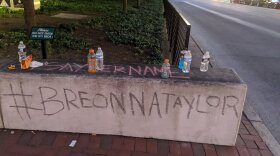A draft ordinance banning all use of no-knock warrants in Lexington was brought before city leaders Tuesday.
The proposed ordinance bars Lexington police from seeking any warrant that would allow them enter unannounced, going a step further than a recently passed state law that limit — but does not ban — no-knock warrants.
"I believe Senate Bill 4 gave us guidance in regard to warrants statewide, but we have an opportunity to locally craft an ordinance and make a local policy that actually addresses some of the issues that have been raised from some of the folks in our community," Lexington Councilman James Brown told colleagues.
The ordinance also sets out new parameters for the use of any search warrant. Under the measure, police would be required to knock and announce their presence, wait at least 15 seconds before entering, and have body cameras recording throughout the process.
While no-knock warrants would be explicitly banned, a longstanding rule regarding what are known as "exigent circumstances," would remain. Attorney for the city Keith Horn gave an example.
"An officer may approach a house and see through the window that someone is attacking another person and that person is yelling for help. You do not have to knock and announce to enter in that case because it's an exigent circumstance," Horn explained.
Brown said he hopes the council would agree to put the new warrant rule into effect on July 1st, a date by which all officers are expected to be outfitted with body-worn cameras.
The discussion follows renewed calls by Black faith leaders to take stronger action regarding the warrants, in the wake of protests centered on the death of Breonna Taylor in 2020 at the hands of Louisville police.
Lexington Police Chief Lawrence Weathers, who is also Black, has been hesitant to endorse an across-the-board ban in the past, telling the city council last year that he worries about a situation where police couldn't act to save someone's life without the warrant. He told city leaders then that the department had only used no-knock warrants about four times in the previous five years.






